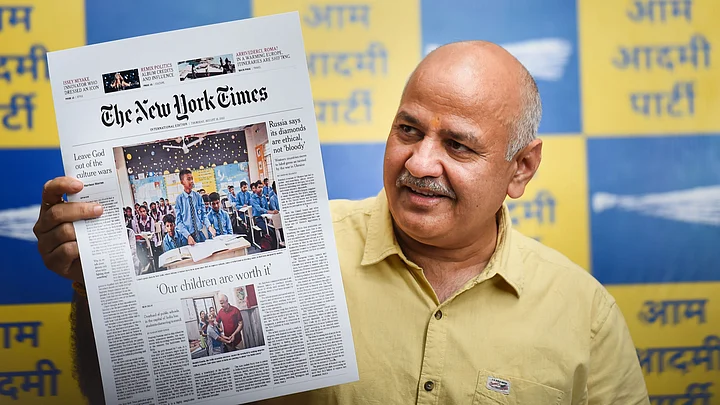Delhi deputy chief minister Manish Sisodia and former health minister Satyendar Jain have resigned from the cabinet. CM Arvind Kejriwal has accepted their resignations.
The news of the resignation of Manish Sisodia, arrested by the Central Bureau of Investigation (CBI) in the liquor policy scam case, came to the fore after the Supreme Court did not give him relief. Satyendar Jain is in jail for the last nine months but he resigned only now. So the question arises, why was Kejriwal compelled to accept the resignation of Aam Aadmi Party's No. 2 and the architect of its biggest trump card – the Delhi Model of Education?
Let's find out whether this is a way out of the controversy for AAP or will it turn out to be a self-goal.
Three Reasons for Manish Sisodia's Resignation
1.If Sisodia is in jail, who will present the budget?
Sisodia had 18 out of 33 portfolios/departments of the Delhi government. It included major departments like education, finance and home. Sisodia had also taken over the portfolios of Satyendar Jain after his arrest last year.
The Delhi government has to present its budget in the first week of March, and Sisodia's arrest just a few days before that has led to a headache for the Kejriwal government. Sisodia did not get relief from the Supreme Court and he may not be able to come out of jail anytime soon. In such a situation, Kejriwal must have thought it prudent to accept Sisodia's resignation and give his portfolio to someone else.
2. Relief from BJP's pressure politics over resignation
Ever since the arrest of Sisodia, the Bharatiya Janata Party (BJP) had gotten aggressive over the demand of his resignation. The BJP did not raise the demand for the resignation of Satyendar Jain, who has been in jail for the last nine months, with the same vigour as in the case of Sisodia.
The reason for this was clear. This time the biggest minister of Kejriwal government was arrested. By accepting the resignations of Sisodia and Jain, Kejriwal has snatched the opportunity from the BJP to say that his cabinet has ministers who are in jail.
3. AAP can now corner BJP over shielding tainted leaders
By taking the resignation of both its ministers, AAP has tried to convey the message that this was done so that the investigation is not affected. Along with this, AAP can now start targetting BJP leaders facing corruption charges.
Immediately after the resignations, AAP accused the BJP in a tweet that when opposition leaders facing charges defect and join the saffron party, all allegations disappear.
AAP MP Sanjay Singh has said that the ministers' resignations is not an admission of guilt. Calling it an "administrative step," he insisted that Keriwal accepted the resignations so that the work of Delhi government doesn't get disrupted in any way.
Risk of Self-Goal?
With the resignation of Sisodia and Jain, AAP may pat itself on the back and say that keeping morality and Delhi people's work in mind, the resignations were accepted but the BJP is forging a different narrative. BJP spokespersons and leaders are seen setting the narrative that there's no smoke without fire. This is the reason why the BJP which was earlier demanding the resignation of Sisodia, is now directly demanding the resignation of Kejriwal.
In such a situation, if the BJP is even a little successful in its narrative, then it can prove to be a self-goal for AAP. The party came to power styling itself as an anti-corruption crusader so a dent in that image can cost the party heavily.
AAP is scared of self-goals also because Kejriwal this time has taken a decision moving away from his old pattern. If we look at the politics of the Delhi CM, he is not known to be the one to surrender. He holds sit-ins against the opponents, goes on hunger strikes, finds new ways to protest and put forward his points. He faces the challenges head-on. But this time we are seeing something different. In this context, it will be interesting to see in whose favour this decision goes in the upcoming assembly and Lok Sabha elections.
